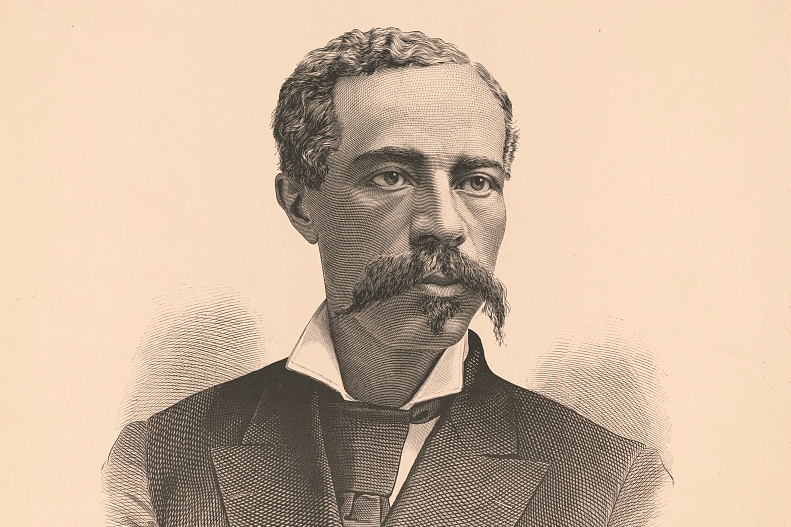
The formerly enslaved lawmaker who warned about rewriting Black history
This article is adapted from “Minority Rule: The Right-Wing Attack on the Will of the People — and the Fight to Resist It,” published Tuesday by Farrar, Straus and Giroux.
More than a century before the backlash to the post-George Floyd racial reckoning produced book bans and restrictions on Black history curriculums, a pioneering Black lawmaker wrote a landmark critique of White historians’ attempt to rewrite the narrative of the Reconstruction era.
In 1913, John Roy Lynch published “The Facts of Reconstruction,” one of the first histories of the era written by a Black leader who participated in the South’s transformation after the Civil War.
In the book, Lynch recounted his improbable life story. Born into slavery on a plantation in Louisiana, he was freed by the Emancipation Proclamation in 1863 and moved to Natchez, Miss., where he received an informal education by overhearing the lessons from a local White school across the alley from his job at a photography store. In 1870, at the age of 22, he joined Mississippi’s first integrated legislature, helping ratify the 14th and 15th amendments, which guaranteed equal citizenship to formerly enslaved people and voting rights to Black men.
In 1873, the 24-year-old Lynch became speaker of the Mississippi House, the first Black man to hold that position in any state. A year later, he made history again, becoming the first Black member of the U.S. House from Mississippi. He helped pass the last of Congress’s major civil rights bills during Reconstruction, banning discrimination in hotels, on trains and in all public accommodations.
It was the high-water mark of Black political power in the state. African Americans comprised more than 40 percent of the legislature and held the offices of lieutenant governor, secretary of state, and secretary of education. As Black influence grew in the majority-Black state, outnumbered White residents resorted to increasingly extreme tactics to regain power. In 1875, segregationists took back the state by force, forming militia groups that attacked integrated political meetings and kept Black voters from the polls. Lynch lost his seat in Congress a year later, when Democratic election officials invalidated nearly 5,000 votes cast for him.
Then came the revisionism. The histories of the era written by Lynch’s White contemporaries described the period as a tragic farce, not because multiracial democracy had been overturned so violently and abruptly, but because it had been attempted at all. Black Southerners were portrayed as ignorant and corrupt, undeserving of the benefits of citizenship and easily duped by greedy Northern “carpetbaggers” and conniving Southern “scalawags.”
Lynch wrote “The Facts of Reconstruction,” after leaving Mississippi and settling in Chicago, to counteract this weaponization of history. “Very much, of course, has been written and published about Reconstruction, but most of it is superficial and unreliable; and, besides, nearly all of it has been written in such a style and tone as to make the alleged facts related harmonize with what was believed to be demanded by public sentiment,” he wrote. His goal was “to present the other side.”

Today, a debate over the country’s racial history is again raging, as one recent leading candidate for the 2024 Republican presidential nomination didn’t mention slavery among the causes of the Civil War and another restricted how Black history could be taught. Seventy-four laws have been passed at the state level since 2021 limiting how race, sex and gender are taught in schools, a Washington Post investigation found.
These kinds of fights date back more than a century, to the critiques of Reconstruction that formed the first serious histories of the era. In the late 1880s, James Ford Rhodes, an Ohio industrialist turned amateur historian, began publishing his highly popular, seven-volume “History of the United States from the Compromise of 1850 to the Final Restoration of Home Rule at the South in 1877.” “No large policy in our country,” he wrote, “has ever been so conspicuous a failure as that of forcing universal negro suffrage upon the South.” He referred to Reconstruction as the “oppression of the South by the North.”
Lynch critiqued Rhodes’s work in a series of articles in the Journal of Negro History in 1917 and 1918, following publication of “The Facts of Reconstruction.” “I regret to say that, so far as the Reconstruction period is concerned, it is not only inaccurate and unreliable but it is the most biased, partisan, and prejudiced historical work I have ever read,” he wrote.
Lynch drew on his own experiences to defend Reconstruction. In addition to passing landmark civil rights laws, the integrated Mississippi legislature built new roads, hospitals and schools while instituting landmark reforms such as the first system of public education. The state governments under Reconstruction “were the best governments those States ever had before or have ever had since,” Lynch argued, because “they were the first and only governments in that section that were based upon the consent of the governed.”
But Lynch’s defense of Reconstruction was overshadowed by the writings of White historians hostile to Black suffrage, led by Columbia University historian William Archibald Dunning and his influential PhD students, many of whom traveled from the South to study with him. They were the first generation of professional historians who produced seminal works on Reconstruction and detailed studies of each Southern state that defined how the era was understood for decades. The Dunning school provided “an intellectual foundation for Jim Crow,” the Columbia University historian Eric Foner wrote.
This rewriting of history propelled the Lost Cause movement, led by Confederate veterans and their families, which promoted reconciliation efforts with the North by portraying the Civil War not as a fight to maintain slavery, but as a noble struggle to preserve the Southern way of life. As Reconstruction laws were wiped from the books, monuments were erected to Confederate generals throughout the South, the works of Rhodes and Dunning circulated widely, and the ultra-racist 1915 film “The Birth of a Nation” was a smash hit, becoming the first film shown at the White House and reviving the Ku Klux Klan.
“The Southern victory over Reconstruction replaced Union victory in the war and Jim Crow laws replaced the Fourteenth Amendment in their places of honor in national memory,” David Blight wrote in “Race and Reunion: The Civil War in American Memory.”
Lynch and his effort to preserve an accurate version of the history of Reconstruction have been largely forgotten. But as the country once again argues over its racial past, his work is arguably more important than ever.
Ari Berman is Mother Jones’ national voting rights correspondent and the author of the new book “Minority Rule: The Right-Wing Attack on the Will of the People — and the Fight to Resist It.”
News Related-
Russian court extends detention of Wall Street Journal reporter Gershkovich until end of January
-
Russian court extends detention of Wall Street Journal reporter Evan Gershkovich, arrested on espionage charges
-
Israel's economy recovered from previous wars with Hamas, but this one might go longer, hit harder
-
Stock market today: Asian shares mixed ahead of US consumer confidence and price data
-
EXCLUSIVE: ‘Sister Wives' star Christine Brown says her kids' happy marriages inspired her leave Kody Brown
-
NBA fans roast Clippers for losing to Nuggets without Jokic, Murray, Gordon
-
Panthers-Senators brawl ends in 10-minute penalty for all players on ice
-
CNBC Daily Open: Is record Black Friday sales spike a false dawn?
-
Freed Israeli hostage describes deteriorating conditions while being held by Hamas
-
High stakes and glitz mark the vote in Paris for the 2030 World Expo host
-
Biden’s unworkable nursing rule will harm seniors
-
Jalen Hurts: We did what we needed to do when it mattered the most
-
LeBron James takes NBA all-time minutes lead in career-worst loss
-
Vikings' Kevin O'Connell to evaluate Josh Dobbs, path forward at QB
